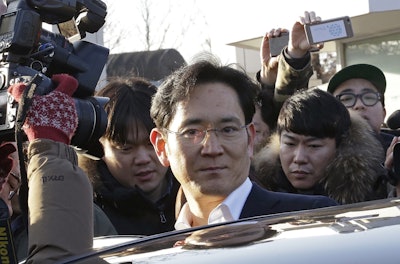
Samsung Electronics' Vice Chairman Lee Jae-yong has vowed to keep up robust investments in key businesses as South Korea's leading company weathers slowing demand and the impact of trade clashes between Washington and Beijing.
In a weekend meeting with top Samsung executives, Lee called for "unwavering focus on long-term, fundamental leadership in technology" and reaffirmed plans to invest 133 trillion won ($112 billion) to strengthen the company's presence in the non-memory chip market.
Samsung also last year announced a three-year plan to invest 180 trillion won ($152 billion) to strengthen its memory chip segment and other key sectors and hire 40,000 more people in the process.
"In this rapidly changing environment, we need to keep our unwavering focus on the long-term, fundamental leadership in technology," Lee said in a statement provided by Samsung.
Samsung is the world's biggest maker of memory chips and smartphones, strong both in components and finished products.
The company saw its operating profit during the last quarter drop more than 60% from a year earlier because of falling chip prices and sluggish demand for display panels.
Samsung has forecast that memory chip prices will continue to fall in the second quarter despite expectations for a modest improvement in demand for mobile products.
Analysts say potential U.S. sanctions on Chinese technology giant Huawei could hurt Samsung by further reducing demand for chips used such products.
In the long run, though, Samsung's smartphone business could benefit from sanctions against its leading rival in that sector.
 In this Feb. 5, 2018, file photo, Lee Jae-yong, vice chairman of Samsung Electronics, gets into a car to leaves a detention center in Uiwang, South Korea. Image credit: AP Photo/Ahn Young-joon, File
In this Feb. 5, 2018, file photo, Lee Jae-yong, vice chairman of Samsung Electronics, gets into a car to leaves a detention center in Uiwang, South Korea. Image credit: AP Photo/Ahn Young-joon, File





















